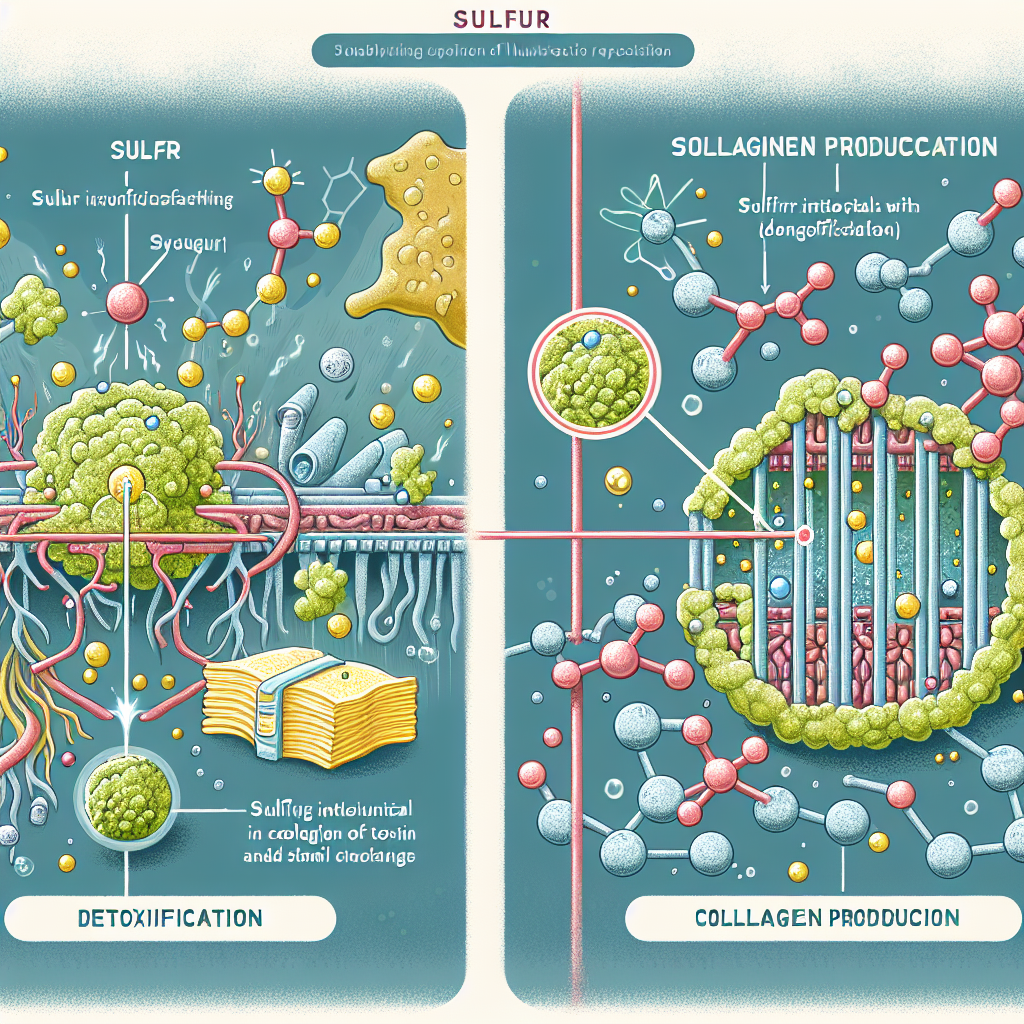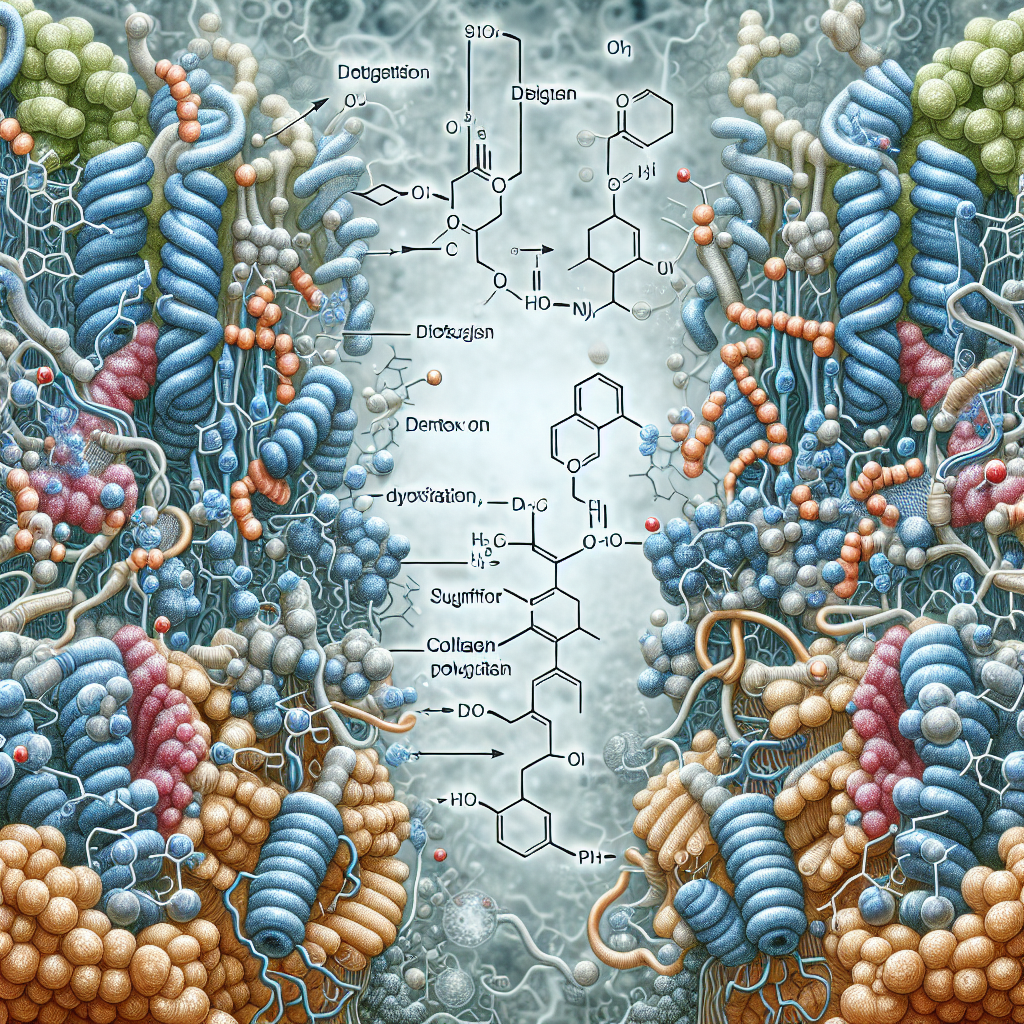The Role of Sulfur in Detoxification and Collagen Production

Discover the crucial role of sulfur in detoxification and collagen production. Learn how this essential element can boost your health and wellness. Visit My Vibrant Vitality now to start your journey towards a healthier you.
Understanding the Crucial Role of Sulfur in Detoxification Processes
Sulfur, the third most abundant mineral in the human body, plays a crucial role in maintaining overall health. It is an essential component of various biological processes, including detoxification and collagen production. Understanding the role of sulfur in these processes can provide valuable insights into its importance for our well-being.
Detoxification is a vital process that helps the body eliminate harmful substances. It primarily occurs in the liver, where toxins are converted into less harmful compounds that can be easily excreted. Sulfur plays a pivotal role in this process. It is a key component of glutathione, a powerful antioxidant that is often referred to as the body’s ‘master detoxifier’. Glutathione neutralizes harmful free radicals, aids in the detoxification of heavy metals and other toxins, and supports immune function. Without sufficient sulfur, the body’s ability to produce and recycle glutathione is compromised, which can lead to a buildup of toxins and oxidative stress.
Sulfur also plays a significant role in the production of taurine, another sulfur-containing compound that aids in detoxification. Taurine supports liver function, helps maintain cellular electrolyte balance, and has antioxidant properties. It also aids in the digestion of fats and the absorption of fat-soluble vitamins, further supporting the body’s detoxification processes.
In addition to its role in detoxification, sulfur is also essential for collagen production. Collagen, the most abundant protein in the body, provides structure and strength to the skin, hair, nails, bones, and connective tissues. Sulfur is a critical component of the amino acids methionine and cysteine, which are necessary for collagen synthesis. Without adequate sulfur, the body’s ability to produce collagen is impaired, which can lead to signs of aging such as wrinkles and sagging skin, as well as joint pain and other health issues.
Furthermore, sulfur helps maintain the flexibility and elasticity of the skin by forming cross-linkages between collagen fibers. This process, known as sulfation, is crucial for maintaining the skin’s youthful appearance and resilience. Sulfur also has anti-inflammatory properties, which can help reduce skin redness and irritation.
Despite its importance, sulfur is often overlooked in discussions about essential nutrients. Many people are unaware of its crucial role in detoxification and collagen production, and as a result, they may not be getting enough of it in their diet. Good sources of dietary sulfur include eggs, meat, fish, garlic, onions, and cruciferous vegetables such as broccoli and kale.
In conclusion, sulfur plays a crucial role in the body’s detoxification processes and collagen production. It is a key component of glutathione and taurine, which help neutralize toxins and support liver function. It is also essential for the synthesis of collagen, which provides structure and strength to the skin, hair, nails, bones, and connective tissues. Ensuring adequate sulfur intake through a balanced diet can support overall health and well-being.
The Importance of Sulfur in Collagen Production and Skin Health

Sulfur, a naturally occurring mineral, is the third most abundant mineral in the human body, and it plays a crucial role in maintaining overall health. It is an essential component in the production of collagen, the protein that forms the basic structure of our skin, hair, nails, and connective tissues. Moreover, sulfur is also a key player in the body’s detoxification process.
Collagen, a protein that provides strength and elasticity to our skin, is largely composed of sulfur-containing amino acids. These amino acids, namely methionine and cysteine, are responsible for the formation of disulfide bonds, which provide strength and resilience to the collagen fibers. Without sufficient sulfur, the production of these amino acids is compromised, leading to a decrease in collagen synthesis. This can result in a variety of skin issues, including dryness, wrinkles, and loss of elasticity.
Sulfur also plays a significant role in the health of our skin by contributing to its hydration and detoxification. It helps in the production of keratin, a protein that is essential for the health and vitality of our skin, hair, and nails. Keratin’s structure allows it to hold onto water molecules, thereby helping to keep our skin hydrated.
In addition to its role in collagen and keratin production, sulfur is also involved in the body’s detoxification process. It is a component of glutathione, one of the body’s most potent antioxidants and detoxifiers. Glutathione helps to neutralize harmful free radicals and remove toxins from the body, thereby protecting our cells from damage.
Sulfur’s role in detoxification is not limited to its involvement in glutathione production. It also aids in the detoxification process by acting as a sulfur donor in phase II liver detoxification. During this phase, sulfur-containing compounds are attached to toxins to make them more water-soluble, allowing them to be excreted from the body more easily.
Despite its importance, sulfur is often overlooked in discussions about essential nutrients. However, a deficiency in sulfur can lead to a variety of health issues, including skin problems, joint pain, and impaired detoxification. Therefore, it is important to ensure that we are getting enough sulfur in our diet.
Sulfur can be found in a variety of foods, including eggs, meat, fish, garlic, onions, and cruciferous vegetables such as broccoli, cauliflower, and cabbage. It can also be obtained from dietary supplements, such as methylsulfonylmethane (MSM), which is a naturally occurring form of organic sulfur.
In conclusion, sulfur plays a crucial role in maintaining the health and vitality of our skin by contributing to collagen production and aiding in detoxification. By ensuring that we are getting enough sulfur in our diet, we can help to support our skin’s health and overall well-being.
Exploring the Dual Role of Sulfur in Detoxification and Collagen Production
Sulfur, the third most abundant mineral in the human body, plays a crucial role in maintaining overall health. It is an essential component of various biological processes, including detoxification and collagen production. This article aims to explore the dual role of sulfur in these two vital functions.
Detoxification is a natural process that the body undertakes to eliminate harmful substances, such as toxins, waste products, and other foreign materials. Sulfur plays a pivotal role in this process. It is a key component of glutathione, one of the most potent antioxidants in the body. Glutathione is often referred to as the body’s “master antioxidant” because it neutralizes harmful free radicals, boosts the immune system, and detoxifies the body. Without sulfur, the body cannot produce glutathione, which can lead to a buildup of toxins and oxidative stress.
Sulfur also aids in detoxification by supporting liver function. The liver is the body’s primary detoxification organ, and it relies heavily on sulfur to perform its duties effectively. Sulfur compounds are involved in phase II liver detoxification, where they bind to toxins and convert them into a water-soluble form that can be excreted from the body. This process, known as sulfation, is one of the major detoxification pathways in the liver.
Transitioning from detoxification to collagen production, sulfur’s role is equally significant. Collagen is a protein that provides structure and strength to the skin, hair, nails, bones, and connective tissues. It is the most abundant protein in the human body, and its production is heavily reliant on sulfur.
Sulfur is a critical component of the amino acids methionine and cysteine, which are essential for collagen synthesis. These amino acids contribute to the stability and strength of collagen fibers. Without sufficient sulfur, collagen production can be compromised, leading to signs of aging such as wrinkles, sagging skin, and brittle nails.
Moreover, sulfur has a unique ability to form cross-linkages, creating flexible bonds between proteins. In the context of collagen, these cross-linkages help to maintain the elasticity and flexibility of the skin. This is why sulfur is often found in skincare products, as it can help to preserve the youthful appearance of the skin.
In conclusion, sulfur plays a dual role in detoxification and collagen production, both of which are essential for maintaining overall health. It aids in detoxification by supporting the production of glutathione and facilitating liver function. Simultaneously, it contributes to collagen production by providing essential amino acids and forming cross-linkages between proteins. Therefore, ensuring adequate sulfur intake is crucial for optimal health. Foods rich in sulfur include garlic, onions, eggs, and cruciferous vegetables. However, if dietary intake is insufficient, sulfur supplements may be considered under the guidance of a healthcare professional.